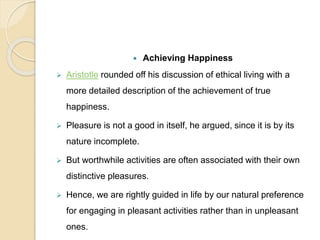Aristotle was a Greek philosopher who lived from 384-322 BC. He was a student of Plato and founded his own school called the Lyceum in Athens. Aristotle made significant contributions across many fields, including logic, physics, biology and ethics. He emphasized empirical observation and reasoning in his works. Aristotle rejected some of Plato's theories like the theory of forms. He is considered one of the most influential ancient philosophers and developed logical systems still used today.
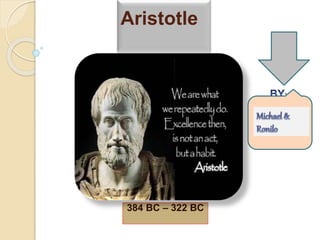













![ Armed with these distinctions, Aristotle proposed in Physics II, 3 that
we employ four very different kinds of explanatory principle
{Gk. αιτιον [aition]} to the question of why a thing is, thefour causes:
material cause
formal cause
efficient cause
final cause](https://image.slidesharecdn.com/aristotle-180113052646/85/Aristotle-15-320.jpg)

![ The formal cause {Gk. ειδος [eidos]} is the pattern or essence in
conformity with which these materials are assembled.
Thus, the formal cause of our exemplary house would be the sort of
thing that is represented on a blueprint of its design.
This, too, is part of the explanation of the house, since its materials
would be only a pile of rubble (or a different house) if they were not
put together in this way.](https://image.slidesharecdn.com/aristotle-180113052646/85/Aristotle-17-320.jpg)

![ Lastly, the final cause {Gk. τελος [télos]} is the end or purpose for which
a thing exists, so the final cause of our house would be to provide
shelter for human beings.
This is part of the explanation of the house's existence because it would
never have been built unless someone needed it as a place to live.
Causes of all four sorts are necessary elements in any adequate
account of the existence and nature of the thing, Aristotle believed, since
the absence or modification of any one of them would result it the
existence of a thing of some different sort.
Moreover, an explanation that includes all four causes completely
captures the significance and reality of the thing itself.](https://image.slidesharecdn.com/aristotle-180113052646/85/Aristotle-19-320.jpg)




![ Higher Truths
Aristotle also offered a detailed account of the dynamic process of
change.
A potentiality {Gk.δυναμις [dynamis]} is either the passive capacity of
a substance to be changed or (in the case of animate beings) its
active capacity to produce change in other substances in
determinate ways.
Anactuality {Gk. ενεργεια [energeia]} is just the realization of one of
these potentialities, which is most significant when it includes not
merely the movement but also its purpose.](https://image.slidesharecdn.com/aristotle-180113052646/85/Aristotle-24-320.jpg)




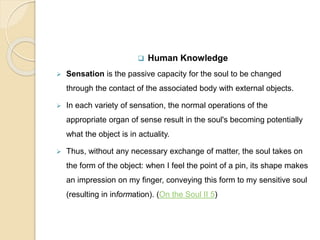


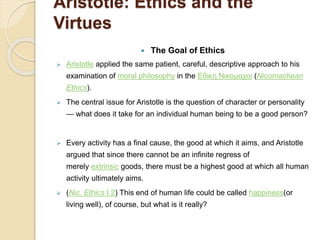
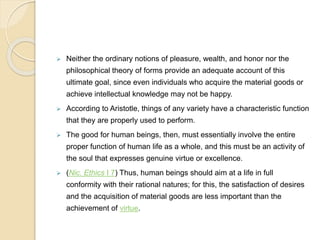

![ The Nature of Virtue
Ethics is not merely a theoretical study for Aristotle.
Unlike any intellectual capacity, virtues of character
are dispositions to act in certain ways in response to similar
situations, the habits of behaving in a certain way.
Thus, good conduct arises from habits that in turn can only be
acquired by repeated action and correction, making ethics an
intensely practical discipline.
Each of the virtues is a state of being that naturally seeks
its mean {Gk. μεσος [mesos]} relative to us.](https://image.slidesharecdn.com/aristotle-180113052646/85/Aristotle-35-320.jpg)
![ According to Aristotle, the virtuous habit of action is always an
intermediate state between the opposed vices of excess and
deficiency: too much and too little are always wrong; the right kind of
action always lies in the mean. (Nic. Ethics II 6) Thus, for example:
with respect to acting in the face of danger,
courage {Gk. ανδρεια [andreia]} is a mean between
the excess of rashness and the deficiency of cowardice;
with respect to the enjoyment of pleasures,
temperance {Gk. σωφρσυνη [sophrosúnê]} is a mean between
the excess of intemperance and the deficiency of insensibility;](https://image.slidesharecdn.com/aristotle-180113052646/85/Aristotle-36-320.jpg)
![ with respect to spending money,
generosity is a mean between
the excess of wastefulness and the deficiency of stinginess;
with respect to relations with strangers,
being friendly is a mean between
the excess of being ingratiating and the deficiency of being surly;
and
with respect to self-esteem,
magnanimity {Gk. μεγαλοψυχι&alpha [megalopsychia]} is a
mean between
the excess of vanity and the deficiency of pusillanimity.](https://image.slidesharecdn.com/aristotle-180113052646/85/Aristotle-37-320.jpg)




![ Deliberate Choice
Although the virtues are habits of acting or dispositions to act in
certain ways, Aristotlemaintained that these habits are acquired by
engaging in proper conduct on specific occasions and that doing so
requires thinking about what one does in a specific way.
Neither demonstrative knowledge of the sort employed in science
nor aesthetic judgment of the sort applied in crafts are relevant to
morality.
The understanding {Gk. διανοια [diánoia]} can only explore the
nature of origins of things, on Aristotle's view,
and wisdom {Gk. σοφια [sophía]} can only trace the demonstratable
connections among them.](https://image.slidesharecdn.com/aristotle-180113052646/85/Aristotle-42-320.jpg)
![ But there is a distinctive mode of thinking that does provide
adequately for morality, according to Aristotle: practical intelligence
or prudence {Gk. φρνησις [phrónêsis]}.
This faculty alone comprehends the true character of individual and
community welfare and applies its results to the guidance of human
action.
Acting rightly, then, involves coordinating our desires with correct
thoughts about the correct goals or ends.](https://image.slidesharecdn.com/aristotle-180113052646/85/Aristotle-43-320.jpg)

![ Weakness of the Will
But doing the right thing is not always so simple, even though few
people deliberately choose to develop vicious habits.
Aristotle sharply disagreed with Socrates's belief that knowing what
is right always results in doing it.
The great enemy of moral conduct, on Aristotle's view, is precisely
the failure to behave well even on those occasions when one's
deliberation has resulted in clear knowledge of what is right.
Incontinent agents suffer from a sort of weakness of the
will {Gk. ακρασια [akrásia]} that prevents them from carrying out
actions in conformity with what they have reasoned.](https://image.slidesharecdn.com/aristotle-180113052646/85/Aristotle-45-320.jpg)
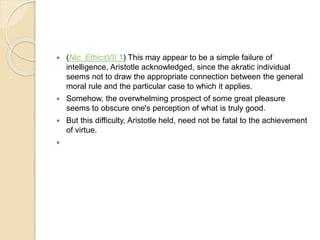

![ Friendship
In a particularly influential section of the Ethics, Aristotle considered
the role of human relationships in general and friendship {Gk. φιλια
[philia]} in particular as a vital element in the good life.
For without friends no one would choose to live, though he had all
other goods.](https://image.slidesharecdn.com/aristotle-180113052646/85/Aristotle-48-320.jpg)



